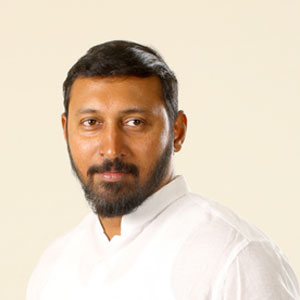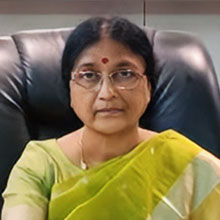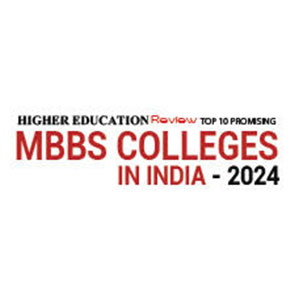
Malla Reddy Medical College For Women: Empowering Women To Be Tomorrow's Healthcare Professionals
By Dr. Ch Bhadra Reddy, Chairman
Over the years, the interest in medical courses has been steadily rising among students, particularly among women. This trend reflects a growing recognition of the importance of diverse representation in the healthcare sector and the increasing opportunities for women in medicine. Educational institutions dedicated to providing specialized medical education for women have played a significant role in this development.
One notable institution is Malla Reddy Medical College for Women (MRMCW), established in 2013 with the primary goal of delivering high-quality medical education to women. MRMCW is affiliated with Kaloji Narayana Rao University of Health Sciences (KNRUHS) in Warangal, Telangana State, and is recognized by the National Medical Commission (NMC) of India.
In 2019, MRMCW adopted Competency-Based Medical Education (CBME) as envisioned by the NMC. This curriculum ensures that Indian medical graduates are prepared to meet the healthcare needs of the country while maintaining global relevance. To support this objective, MRMCW boasts state-of-the-art healthcare infrastructure, including technologically advanced laboratories and classrooms.
The college offers both undergraduate (UG) and postgraduate (PG) programs, providing students with comprehensive training in clinical practice, research, and teaching.

Malla Reddy Medical College for Women (MRMCW) aspires to produce doctors who skillfully blend the art of healing with the science of medicine. Established in 2013 and affiliated with Kaloji Narayana Rao University of Health Sciences (KNRUHS), MRMCW emphasizes active student participation in practical learning activities across its undergraduate (UG), postgraduate (PG), and super specialty courses.
The college employs innovative, student-centric teaching methods such as experiential learning, interdisciplinary learning, participatory learning, problem-solving methodologies, self-directed learning, patient-centric and evidence-based learning, project-based learning, and role plays. These methods include various programs and activities like skill lab training, family adoption, district residency, clerkship, conferences, workshops, and health camps.
To support the effective implementation of the Competency- Based Medical Education (CBME) curriculum, MRMCW has established institutional policies and committees. A strong mentor-mentee program is in place to foster the professional growth of students and promote excellence in teaching, learning, research, and academic leadership. The college also encourages holistic student development through participation in co-curricular and extracurricular activities, facilitated by student clubs that enhance skills in communication, leadership, teamwork, and professional excellence. The Family Adoption Programme (FAP) further engages students with the community, providing insights into living conditions and health needs.
MRMCW maintains high standards for its faculty through rigorous recruitment and selection processes, ongoing professional development, performance evaluations, research support, mentorship programs, incentive schemes, workload management, and feedback mechanisms.
These strategies ensure that faculty members remain at the forefront of their fields, fostering a culture of excellence in teaching and research. By prioritizing faculty development and student-centered learning, MRMCW cultivates an environment conducive to high-quality medical education and research, ultimately benefiting both students and the broader healthcare community.

Recognizing the need for a diversified approach to prepare medical graduates for future challenges, MRMCW has implemented several key strategies. Interdisciplinary learning integrates knowledge from social sciences, public health, and ethics to create a comprehensive understanding of the healthcare industry. This approach ensures that students are well-versed in the multifaceted nature of healthcare.
MRMCW places a strong emphasis on clinical experience, providing students with early and varied clinical competencies. Hands-on training in simulation skill labs is mandatory, helping students develop practical skills and apply their knowledge in real-world situations. Additionally, communication skills are taught through a longitudinal learning program for both undergraduate and postgraduate students, ensuring effective doctor-patient relationships and successful interactions within healthcare teams.
To address the demands of academic and professional life, MRMCW teaches resilience and well-being, focusing on stress management and self-care. Technological proficiency is another priority, with students encouraged to stay updated on medical technology and informatics through online courses (MOOCs). Research and critical thinking are fostered through participation in ICMR-funded projects, with financial incentives provided for conference attendance and publication of research papers.
MRMCW employs novel teaching and learning strategies, including self-directed learning, small group teaching, group discussions, and clinical case presentations. Peer teaching initiatives further develop learning competencies. Continuous internal assessment and evaluation, along with remedial classes for slow learners, ensure all students progress effectively.
Extracurricular activities are promoted through student clubs, enhancing leadership abilities and academic development. Interprofessional education prepares students for collaborative healthcare environments, with workshops and seminars on key aspects such as antibiotic stewardship and empathy to improve patient safety.
India's industry-academia partnerships are crucial for innovation and economic growth. Recognizing the skill-gap, universities and colleges partner with industries to train job-ready graduates. Government programs like SPARC, IMPRINT, and UAY provide funding and infrastructure support, encouraging these collaborations. Educational institutions are evolving to meet global workforce needs, updating curricula, and facilitating collaborative research projects.
Practical skills and a problem-solving mindset, enhanced through industry collaborations, improve students' adaptability to workplace demands. Understanding industry dynamics and expectations through these partnerships boosts job prospects and expands professional networks. By embracing these strategies, MRMCW prepares its students to excel in the dynamic healthcare landscape.
”MRMCW cultivates an environment conducive to high-quality medical education & research, ultimately benefiting both students & the broader healthcare community”
MRMCW fosters leadership in economic development by advancing technology, encouraging innovation and entrepreneurship, and engaging in community outreach. The institution emphasizes diversity, equity, and inclusion, ensuring that faculty, staff, and students have the opportunity to succeed professionally and academically. MRMCW aspires to be a national model of an inclusive community that supports the academic and professional success of all its members. The college is dedicated to educating and engaging a diverse community of students not only from Telangana, but also from other states of India, preparing them to become innovators and leaders in a global society.
MRMCW strives for continuous improvement as a leading research institution, attracting and retaining world-class students to advance knowledge and improve human health. The college seeks to expand its role as a hub for innovation, economic development, and medical technology transfer, aiming to become a global leader in medical education and research, transforming knowledge to address societal challenges.
"We are committed to providing world-class medical education and research opportunities to our students and have done so in a manner that remains among the most affordable institution in the state. Our vision is to continue to change the lives of our students, while changing the world around us, improving the human condition everywhere in Telangana and Indian society”, concludes Dr. Ch Bhadra Reddy, Chairman, Malla Reddy Health City.
One notable institution is Malla Reddy Medical College for Women (MRMCW), established in 2013 with the primary goal of delivering high-quality medical education to women. MRMCW is affiliated with Kaloji Narayana Rao University of Health Sciences (KNRUHS) in Warangal, Telangana State, and is recognized by the National Medical Commission (NMC) of India.
In 2019, MRMCW adopted Competency-Based Medical Education (CBME) as envisioned by the NMC. This curriculum ensures that Indian medical graduates are prepared to meet the healthcare needs of the country while maintaining global relevance. To support this objective, MRMCW boasts state-of-the-art healthcare infrastructure, including technologically advanced laboratories and classrooms.
The college offers both undergraduate (UG) and postgraduate (PG) programs, providing students with comprehensive training in clinical practice, research, and teaching.

Dr. S Sreelatha, Dean
Unique Courses by Trained Faculties
Malla Reddy Medical College for Women (MRMCW) aspires to produce doctors who skillfully blend the art of healing with the science of medicine. Established in 2013 and affiliated with Kaloji Narayana Rao University of Health Sciences (KNRUHS), MRMCW emphasizes active student participation in practical learning activities across its undergraduate (UG), postgraduate (PG), and super specialty courses.
The college employs innovative, student-centric teaching methods such as experiential learning, interdisciplinary learning, participatory learning, problem-solving methodologies, self-directed learning, patient-centric and evidence-based learning, project-based learning, and role plays. These methods include various programs and activities like skill lab training, family adoption, district residency, clerkship, conferences, workshops, and health camps.
To support the effective implementation of the Competency- Based Medical Education (CBME) curriculum, MRMCW has established institutional policies and committees. A strong mentor-mentee program is in place to foster the professional growth of students and promote excellence in teaching, learning, research, and academic leadership. The college also encourages holistic student development through participation in co-curricular and extracurricular activities, facilitated by student clubs that enhance skills in communication, leadership, teamwork, and professional excellence. The Family Adoption Programme (FAP) further engages students with the community, providing insights into living conditions and health needs.
MRMCW maintains high standards for its faculty through rigorous recruitment and selection processes, ongoing professional development, performance evaluations, research support, mentorship programs, incentive schemes, workload management, and feedback mechanisms.
These strategies ensure that faculty members remain at the forefront of their fields, fostering a culture of excellence in teaching and research. By prioritizing faculty development and student-centered learning, MRMCW cultivates an environment conducive to high-quality medical education and research, ultimately benefiting both students and the broader healthcare community.

Dr. Ch Preeti Reddy, Vice-Chairman
Future Ready with Industry Collaborations
Recognizing the need for a diversified approach to prepare medical graduates for future challenges, MRMCW has implemented several key strategies. Interdisciplinary learning integrates knowledge from social sciences, public health, and ethics to create a comprehensive understanding of the healthcare industry. This approach ensures that students are well-versed in the multifaceted nature of healthcare.
MRMCW places a strong emphasis on clinical experience, providing students with early and varied clinical competencies. Hands-on training in simulation skill labs is mandatory, helping students develop practical skills and apply their knowledge in real-world situations. Additionally, communication skills are taught through a longitudinal learning program for both undergraduate and postgraduate students, ensuring effective doctor-patient relationships and successful interactions within healthcare teams.
To address the demands of academic and professional life, MRMCW teaches resilience and well-being, focusing on stress management and self-care. Technological proficiency is another priority, with students encouraged to stay updated on medical technology and informatics through online courses (MOOCs). Research and critical thinking are fostered through participation in ICMR-funded projects, with financial incentives provided for conference attendance and publication of research papers.
MRMCW employs novel teaching and learning strategies, including self-directed learning, small group teaching, group discussions, and clinical case presentations. Peer teaching initiatives further develop learning competencies. Continuous internal assessment and evaluation, along with remedial classes for slow learners, ensure all students progress effectively.
Extracurricular activities are promoted through student clubs, enhancing leadership abilities and academic development. Interprofessional education prepares students for collaborative healthcare environments, with workshops and seminars on key aspects such as antibiotic stewardship and empathy to improve patient safety.
India's industry-academia partnerships are crucial for innovation and economic growth. Recognizing the skill-gap, universities and colleges partner with industries to train job-ready graduates. Government programs like SPARC, IMPRINT, and UAY provide funding and infrastructure support, encouraging these collaborations. Educational institutions are evolving to meet global workforce needs, updating curricula, and facilitating collaborative research projects.
Practical skills and a problem-solving mindset, enhanced through industry collaborations, improve students' adaptability to workplace demands. Understanding industry dynamics and expectations through these partnerships boosts job prospects and expands professional networks. By embracing these strategies, MRMCW prepares its students to excel in the dynamic healthcare landscape.
”MRMCW cultivates an environment conducive to high-quality medical education & research, ultimately benefiting both students & the broader healthcare community”
Plan Ahead
MRMCW fosters leadership in economic development by advancing technology, encouraging innovation and entrepreneurship, and engaging in community outreach. The institution emphasizes diversity, equity, and inclusion, ensuring that faculty, staff, and students have the opportunity to succeed professionally and academically. MRMCW aspires to be a national model of an inclusive community that supports the academic and professional success of all its members. The college is dedicated to educating and engaging a diverse community of students not only from Telangana, but also from other states of India, preparing them to become innovators and leaders in a global society.
MRMCW strives for continuous improvement as a leading research institution, attracting and retaining world-class students to advance knowledge and improve human health. The college seeks to expand its role as a hub for innovation, economic development, and medical technology transfer, aiming to become a global leader in medical education and research, transforming knowledge to address societal challenges.
"We are committed to providing world-class medical education and research opportunities to our students and have done so in a manner that remains among the most affordable institution in the state. Our vision is to continue to change the lives of our students, while changing the world around us, improving the human condition everywhere in Telangana and Indian society”, concludes Dr. Ch Bhadra Reddy, Chairman, Malla Reddy Health City.


